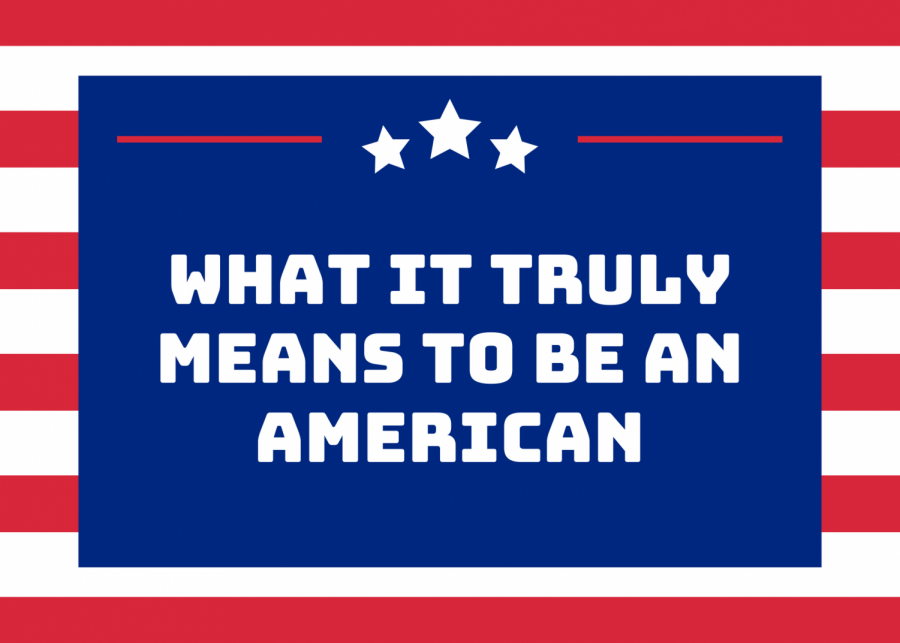What it truly means to be American
“Since the U.S. was discovered in the 18th century, Americans have defined themselves not by their racial, religious or ethnic identity, but by their common values and their belief in individual freedoms.”
February 25, 2020
Since the U.S. was discovered in the 18th century, Americans have defined themselves not by their racial, religious or ethnic identity, but by their common values and their belief in individual freedoms.
The Declaration of Independence, written in 1776, states, “We hold these truths to be self-evident, that all men are created equal, that they are endowed by their Creator with certain unalienable Rights, that among these are Life, Liberty and the pursuit of Happiness.” Our country was founded on these unalienable rights, meaning that they are unable to be taken away. Many other countries don’t give the same constitutional rights to their citizens, making these rights characteristically American. These opening lines of the Declaration embodies an open-armed, American welcome to those who wish to seek a better life, much like the original colonists did many years ago.
For centuries, settling in America has meant new job opportunities and a chance to escape from a corrupt government or simply to reconnect with family. Immigrants have often described the American way as being “paved with gold.” However, in the modern world, many see this statement as more of an ideal than an actualization. Ideally, foreigners should not be met with opposition, because their identity lies not in the color of their skin, but in their core values.
Hostility towards immigrants in this country started surfacing on a national scale in the 19th century. Two of the most notable examples of hostilities in the 1800s were the anti-immigration sentiments towards the Irish and the Chinese Exclusion Act. More recently, widespread hatred of Muslims broke out after the 9/11 attacks in 2001. Hostilites towards foreigners continued in 2016 when the rhetoric of President Donald Trump encouraged discrimination against Mexicans. His campaign to build a wall along the U.S.-Mexican border made many citizens feel like they needed to keep others out in order to preserve the unity of the nation. In 2019, a Gallup survey recorded that over 65 million Americans think that immigration is bad for our country today, which seems odd for a nation made up mostly of immigrants. According to the U.S. Migration Policy Institute, one in seven U.S citizens is foreign born.
This large number of those who disapprove of immigration is due to the widespread belief held by citizens that immigrants are taking away jobs or that they are abusing the welfare system. Director of Immigration Studies for the Center for Global Liberty and Prosperity, Alex Nowrasteh, has refuted these claims saying, “Immigrants likely compete most directly against other immigrants so the effects on less-skilled native-born Americans might be very small or even positive.” His research shows that immigrants are typically attracted to growing regions and they actually increase supply and demand within the economy, expanding employment opportunities despite what others may think. The complaint about welfare abuse is also widely misunderstood, as legal immigrants do not have access to welfare their first five years here (with few exceptions) and illegal immigrants do not have access at all.
Most immigrants coming to America have one desire: to live a more prosperous life than the one left behind. This wish should not be denied to anyone because doing so would contradict the Declaration of Indepence, the very same document that our country was founded on. No one should have the right to decide who is more or less of an American based on one’s physical looks or country of origin. Today, more than one fifth of the total U.S. population is made up of immigrants, according to the 2010 U.S. Census. While some may see this large number and become fearful that foreigners are taking over the American identity, I respond with this: We do not have one identity as Americans. Everyone that has immigrated to America should be allowed to exercise their freedom to choose either to assimilate into American culture or to continue to practice their own customs.
This hate, discrimination and exclusion that is running rampant in our streets is keeping America from its original ideals, but I do not believe these actions of hate are the true American way. Clearly as a country we have made mistakes, but I still believe, like many others, that we have the ability to redeem ourselves. If we keep an open mind and treat others with kindness instead of indifference, then we can set positive examples for future generations. We are not people of hate and fear. We are hard workers, big dreamers, firm believers and we understand the value of freedom. Anyone who embodies these ideals is truly an American, no matter their ethnicity or the country that they were born in.










